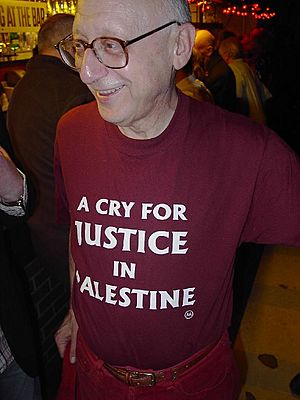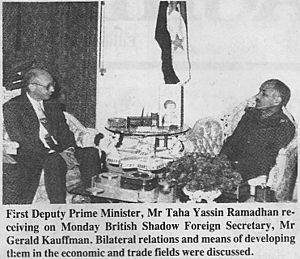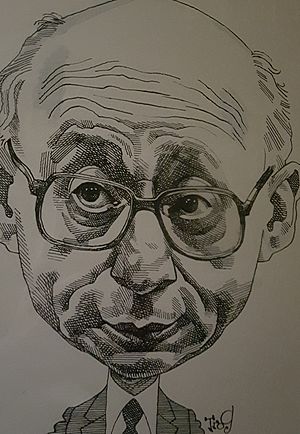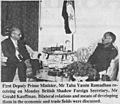Gerald Kaufman facts for kids
Sir Gerald Bernard Kaufman (born June 21, 1930 – died February 26, 2017) was a British politician and author. He was a Member of Parliament (MP) for many years, starting in 1970. He served as a minister in the Labour government from 1974 to 1979. In 2015, he became the "Father of the House," which is the title given to the longest-serving MP in the House of Commons. He held this role until he passed away in 2017.
Quick facts for kids
Gerald Kaufman
|
|||||||||||||||||||||||||||||||||||
|---|---|---|---|---|---|---|---|---|---|---|---|---|---|---|---|---|---|---|---|---|---|---|---|---|---|---|---|---|---|---|---|---|---|---|---|

Kaufman in December 2003
|
|||||||||||||||||||||||||||||||||||
| Father of the House of Commons | |||||||||||||||||||||||||||||||||||
| In office 7 May 2015 – 26 February 2017 |
|||||||||||||||||||||||||||||||||||
| Speaker | John Bercow | ||||||||||||||||||||||||||||||||||
| Preceded by | Peter Tapsell | ||||||||||||||||||||||||||||||||||
| Succeeded by | Kenneth Clarke | ||||||||||||||||||||||||||||||||||
| Chair of the Culture, Media and Sport Committee | |||||||||||||||||||||||||||||||||||
| In office 17 April 1992 – 12 July 2005 |
|||||||||||||||||||||||||||||||||||
| Preceded by | Office established | ||||||||||||||||||||||||||||||||||
| Succeeded by | John Whittingdale | ||||||||||||||||||||||||||||||||||
| Minister of State for Industry | |||||||||||||||||||||||||||||||||||
| In office 12 June 1975 – 4 May 1979 |
|||||||||||||||||||||||||||||||||||
| Prime Minister | James Callaghan | ||||||||||||||||||||||||||||||||||
| Preceded by | Michael Meacher | ||||||||||||||||||||||||||||||||||
| Succeeded by | Adam Butler | ||||||||||||||||||||||||||||||||||
| Parliamentary Under-Secretary of State for the Environment | |||||||||||||||||||||||||||||||||||
| In office 8 March 1974 – 12 June 1975 |
|||||||||||||||||||||||||||||||||||
| Prime Minister | Harold Wilson | ||||||||||||||||||||||||||||||||||
| Preceded by | Michael Heseltine | ||||||||||||||||||||||||||||||||||
| Succeeded by | Ernest Armstrong | ||||||||||||||||||||||||||||||||||
|
|||||||||||||||||||||||||||||||||||
|
|||||||||||||||||||||||||||||||||||
| Personal details | |||||||||||||||||||||||||||||||||||
| Born |
Gerald Bernard Kaufman
21 June 1930 Leeds, Yorkshire, England |
||||||||||||||||||||||||||||||||||
| Died | 26 February 2017 (aged 86) | ||||||||||||||||||||||||||||||||||
| Political party | Labour | ||||||||||||||||||||||||||||||||||
| Alma mater | Queen's College, Oxford | ||||||||||||||||||||||||||||||||||
Born in Leeds, Gerald Kaufman came from a Polish Jewish family. He studied at The Queen's College, Oxford, where he was involved in student politics. After college, he worked as a journalist for newspapers like the Daily Mirror and New Statesman. He also wrote for BBC Television.
Kaufman became active in the Labour Party. He advised Harold Wilson, who was the Prime Minister at the time. In 1970, he was elected to the House of Commons as an MP for Manchester Ardwick.
He served as a minister in the Labour government from 1974 to 1979. After the Labour Party lost the election in 1979, he became a member of the Shadow Cabinet in the 1980s. When his old constituency was changed, he successfully ran for MP in Manchester Gorton in 1983. Later in his career, he led the Culture, Media and Sport Committee from 1992 to 2005. He was made a knight in 2004. Sir Gerald Kaufman was the oldest sitting MP in the UK when he died in February 2017.
He was known for sharing his strong opinions throughout his political career. He was against fox hunting and supported the idea of a Palestinian state. He was also a strong critic of the state of Israel.
Contents
Early Life & First Jobs
Gerald Kaufman was born in Leeds. He was the youngest of seven children. His parents were Polish Jews who moved to England before the First World War. He went to Leeds Grammar School. Later, he earned a degree in philosophy, politics and economics from University of Oxford (Queen's College). While at Oxford, he was the secretary of the Oxford University Labour Club. He once stopped Rupert Murdoch from running for office there.
From 1954 to 1955, Kaufman worked for the Fabian Society. He then became a writer for the Daily Mirror from 1955 to 1964. He also wrote for the New Statesman from 1964 to 1965. During this time, he wrote for TV shows, including the BBC comedy That Was The Week That Was. He was known for a sketch called "silent men of Westminster."
He became more involved in politics again. From 1965 to 1970, he worked as a press officer for the Labour Party. He also became part of Prime Minister Harold Wilson's close group of advisors.
Parliamentary Career
Serving as a Minister & Shadow Minister: 1970–1992

Gerald Kaufman tried to become an MP in 1955 and 1959 but was not successful. He was first elected as an MP for Manchester Ardwick in the 1970 general election. In 1983, he changed constituencies and became the MP for Manchester Gorton. He remained the MP for Gorton until his death.
He served as a junior minister in the Labour government from 1974 to 1979. First, he worked at the Department of the Environment. Then, he moved to the Department of Industry. He was promoted to Minister of State at the Department of Industry in December 1975. During his time as minister, he helped with talks about allowing the Concorde plane to land in the United States. He also helped pass laws that brought the aircraft and shipbuilding industries under government control. In 1978, he became a member of the Privy Council.
When Labour was not in power, Kaufman was a member of the Shadow Cabinet. He was the Shadow Environment Secretary from 1980 to 1983. Then he became Shadow Home Secretary from 1983 to 1987. Finally, he was the Shadow Foreign Secretary from 1987 to 1992.
Later Backbench Work: 1992–2005
In 1992, Kaufman became a "backbencher," meaning he no longer held a ministerial role. He became the chairman of the National Heritage Select Committee. This committee later became the Culture, Media and Sport Committee. He led this committee from 1992 to 2005. He also served on other important parliamentary groups.
Kaufman usually voted with his party, the Labour Party. For example, he voted to support the government's decision regarding the 2003 invasion of Iraq.
In 2004, he was honored with a knighthood for his service to Parliament. This meant he became "Sir Gerald Kaufman."
He was strongly against hunting with hounds. In 2004, he was attacked by people who supported fox hunting. He said they also used offensive language towards him.
Views on Israel
When he was younger, Gerald Kaufman was very interested in Israel. He was a member of a group called Poale Zion, which later became the Jewish Labour Movement. However, over time, he became unhappy with Israel because of how it treated the Palestinian territories.
In 2002, he filmed a BBC documentary called The End of the Affair. In it, he explained his changing views on Israel. He believed Israel had become an "international pariah" because of its prime minister, Ariel Sharon. In 2004, he wrote an article for The Guardian suggesting economic actions against Israel. He believed this could help bring peace to the Middle East. In 2006, he called for Israeli soldiers responsible for the deaths of British citizens to be tried.
During the Gaza War in 2009, Kaufman gave a speech in the House of Commons. He said that the Israeli government used the history of the Holocaust to justify actions against Palestinians. He also compared some statements by Israeli officials to those made by Nazis. He urged the British government to stop selling weapons to Israel.
In June 2009, Kaufman compared Israel's treatment of Palestinians to South Africa under apartheid. He said that the situation in Israel was more upsetting because of how close wealthy Israeli settlers lived to poor Palestinians.
In January 2010, Kaufman led a group of European politicians to Gaza. He described the Israeli blockade of Gaza as "evil." He also said that Israeli officials who allowed the use of certain weapons in Gaza should face legal action. In March 2010, he accused the Conservative Party of being too close to Israel.
In December 2010, Kaufman criticized a proposed change to British law. This change would have prevented visiting Israeli officials from being arrested. He argued that such changes would make the British legal system seem unfair. He also claimed that British Jews were starting to disagree with Israel's human rights actions.
On March 30, 2011, a microphone caught Kaufman making a remark about Jewish people. He apologized for the comment.
In October 2015, at a parliamentary event, Kaufman made controversial statements. He suggested that "Jewish money" influenced the Conservative Party. He also accused Israel of faking Palestinian knife attacks to justify killing Palestinians. These comments were strongly criticized by other politicians, including Jeremy Corbyn, the leader of the Labour Party. Corbyn said Kaufman's remarks were "completely unacceptable and deeply regrettable."
Literary Career
Gerald Kaufman wrote many books and articles. Some of his books were about politics. For example, How to be a Minister (1980) looked at the challenges ministers face when dealing with government officials. He even had former Prime Ministers Harold Wilson and James Callaghan read the book before it was published.
He also wrote about culture. Meet Me in St Louis is a book about the 1944 film starring Judy Garland. He contributed a chapter to a book called Men Who Made Labour. He also served as the chairman of the judges for the Booker Prize in 1999, which is a famous literary award.
Death
Sir Gerald Kaufman passed away on February 26, 2017, after a long illness. He was the first "Father of the House" to die while still in office since 1929. Former Prime Minister Tony Blair praised Kaufman's work and said they were close friends. A memorial service was held for him on March 7, 2017, at Gorton Monastery, a local landmark he had helped restore.
Images for kids
 | Dorothy Vaughan |
 | Charles Henry Turner |
 | Hildrus Poindexter |
 | Henry Cecil McBay |




